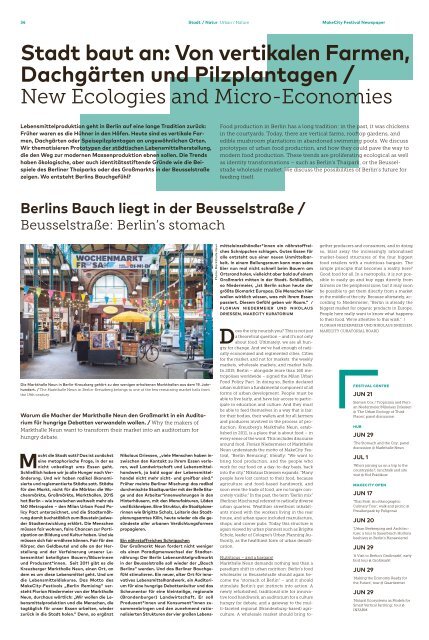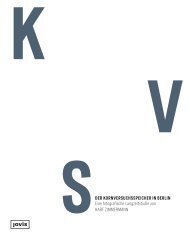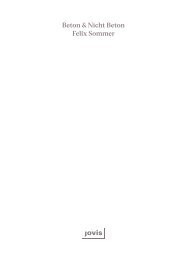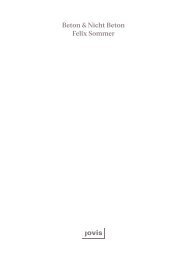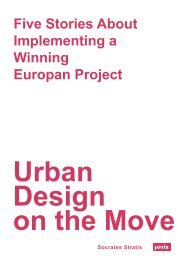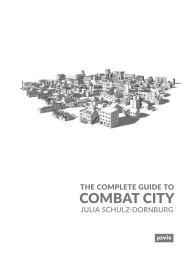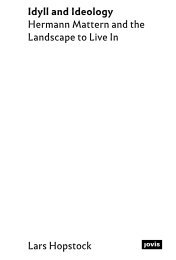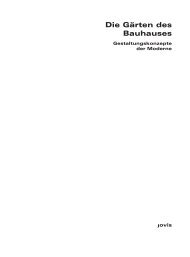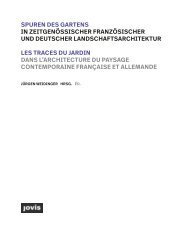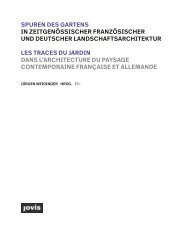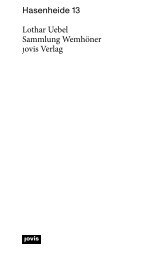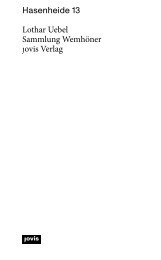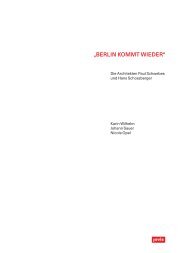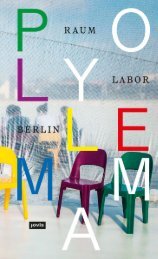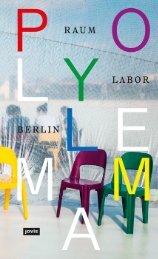Make City 2018 Festival - Newspaper
Create successful ePaper yourself
Turn your PDF publications into a flip-book with our unique Google optimized e-Paper software.
34 Stadt / Natur Urban / Nature<br />
<strong>Make</strong><strong>City</strong> <strong>Festival</strong> <strong>Newspaper</strong><br />
Stadt baut an: Von vertikalen Farmen,<br />
Dachgärten und Pilzplantagen /<br />
New Ecologies and Micro-Economies<br />
Lebensmittelproduktion geht in Berlin auf eine lange Tradition zurück:<br />
Früher waren es die Hühner in den Höfen. Heute sind es vertikale Farmen,<br />
Dachgärten oder Speisepilzplantagen an ungewöhnlichen Orten.<br />
Wir thematisieren Prototypen der städtischen Lebensmittelherstellung,<br />
die den Weg zur modernen Massenproduktion ebnen sollen. Die Trends<br />
haben ökologische, aber auch identitätsstiftende Gründe wie die Beispiele<br />
des Berliner Thaiparks oder des Großmarkts in der Beusselstraße<br />
zeigen. Wo entsteht Berlins Bauchgefühl?<br />
Food production in Berlin has a long tradition: in the past, it was chickens<br />
in the courtyards. Today, there are vertical farms, rooftop gardens, and<br />
edible mushroom plantations in abandoned swimming pools. We discuss<br />
prototypes of urban food production, and how they could pave the way to<br />
modern food production. These trends are proliferating ecological as well<br />
as identity transformations – such as Berlin’s Thaipark, or the Beusselstraße<br />
wholesale market. We discuss the possibilities of Berlin’s future for<br />
feeding itself.<br />
Berlins Bauch liegt in der Beusselstraße /<br />
Beusselstraße: Berlin’s stomach<br />
Die Markthalle Neun in Berlin-Kreuzberg gehört zu den wenigen erhaltenen Markthallen aus dem 19. Jahrhundert.<br />
/ The Markthalle Neun in Berlin-Kreuzberg belongs to one of the few remaining market halls from<br />
the 19th century<br />
Warum die Macher der Markthalle Neun den Großmarkt in ein Auditorium<br />
für hungrige Debatten verwandeln wollen. / Why the makers of<br />
Markthalle Neun want to transform their market into an auditorium for<br />
hungry debate.<br />
Macht die Stadt satt? Das ist zunächst<br />
eine metaphorische Frage, in der es<br />
nicht unbedingt ums Essen geht.<br />
Schließlich haben wir ja alle Hunger nach Veränderung.<br />
Und wir haben radikal ökonomisierte<br />
und reglementierte Städte satt. Städte<br />
für den Markt, nicht für die Märkte: die Wochenmärkte,<br />
Großmärkte, Markthallen. 2015<br />
hat Berlin – wie inzwischen weltweit mehr als<br />
160 Metropolen – den Milan Urban Food Policy<br />
Pact unterzeichnet, und die Stadternährung<br />
damit buchstäblich zum Baustein jedweder<br />
Stadtentwicklung erklärt. Die Menschen<br />
müssen fair wohnen, faire Chancen zur Partizipation<br />
an Bildung und Kultur haben. Und sie<br />
müssen sich fair ernähren können. Fair für den<br />
Körper, den Geldbeutel und alle an der Herstellung<br />
und der Verfeinerung unserer Lebensmittel<br />
beteiligten Bauern/Bäuerinnen<br />
und Produzent*innen. Seit 2011 gibt es die<br />
Kreuzberger Markthalle Neun, einen Ort, an<br />
dem es um diese Lebensmittel geht. Und um<br />
die Lebensmitteldiskurse. Das Motto des<br />
<strong>Make</strong><strong>City</strong>-<strong>Festival</strong>s „Berlin Remixing“ versteht<br />
Florian Niedermeier von der Markthalle<br />
Neun, durchaus wörtlich: „Wir wollen die Lebensmittelproduktion<br />
und die Menschen, die<br />
tagtäglich für unser Essen arbeiten, wieder<br />
zurück in die Stadt holen.“ Denn, so ergänzt<br />
Nikolaus Driessen, „viele Menschen haben inzwischen<br />
den Kontakt zu ihrem Essen verloren,<br />
weil Landwirtschaft und Lebensmittelhandwerk,<br />
ja bald sogar der Lebensmittelhandel<br />
nicht mehr sicht- und greifbar sind.“<br />
Früher meinte Berliner Mischung: das radikal<br />
durchmischte Stadtquartier mit der Belle Etage<br />
und den Arbeiter*innenwohnungen in den<br />
Hinterhäusern, mit den Manufakturen, Läden<br />
und Eckkneipen. Eine Struktur, die Stadtplanerinnen<br />
wie Brigitte Scholz, Leiterin des Stadtplanungsamtes<br />
Köln, heute wieder als die gesündeste<br />
aller urbanen Verdichtungsformen<br />
propagieren.<br />
Ein nährstoffreiches Schnippchen<br />
Der Großmarkt Neun fordert nicht weniger<br />
als einen Paradigmenwechsel der Stadternährung:<br />
Der Berlin Lebensmittelgroßmarkt<br />
in der Beusselstraße soll wieder der „Bauch<br />
Berlins“ werden. Und das Berliner Bauchgefühl<br />
stimulieren. Ein neuer, alter Ort für innovatives<br />
Lebensmittelhandwerk, ein Auditorium<br />
für eine hungrige Debattenkultur und das<br />
Scheunentor für eine kleinteilige, regionale<br />
(Brandenburger) Landwirtschaft. Er soll<br />
Produzent*innen und Konsument*innen zusammenbringen<br />
und den zunehmend rationalisierten<br />
Strukturen der vier großen Lebens-<br />
Photo: Markthalle Neun<br />
mitteleinzelhändler*innen ein nährstoffreiches<br />
Schnippchen schlagen. Gutes Essen für<br />
alle entsteht aus einer neuen Unmittelbarkeit.<br />
In einem Ballungsraum kann man seine<br />
Eier nun mal nicht schnell beim Bauern am<br />
Ortsrand holen, vielleicht aber bald auf einem<br />
Großmarkt mitten in der Stadt. Schließlich,<br />
so Niedermeier, „ist Berlin schon heute der<br />
größte Biomarkt Europas. Die Menschen hier<br />
wollen wirklich wissen, was mit ihrem Essen<br />
passiert. Diesem Gefühl geben wir Raum.“ /<br />
FLORIAN NIEDERMEIER UND NIKOLAUS<br />
DRIESSEN, MAKECITY KURATORIUM<br />
Does the city nourish you? This is not just<br />
a theoretical question – and it’s not only<br />
about food. Ultimately, we are all hungry<br />
for change. And we’ve had enough of radically<br />
economised and regimented cities. Cities<br />
for the market, and not for markets: the weekly<br />
markets, wholesale markets, and market halls.<br />
In 2015, Berlin – alongside more than 160 metropolises<br />
worldwide – signed the Milan Urban<br />
Food Policy Pact. In doing so, Berlin declared<br />
urban nutrition a fundamental component of all<br />
forms of urban development. People must be<br />
able to live fairly, and have fair access to participate<br />
in education and culture. And they must<br />
be able to feed themselves in a way that is fair:<br />
for their bodies, their wallets and for all farmers<br />
and producers involved in the process of production.<br />
Kreuzberg’s Markthalle Neun, established<br />
in 2011, is a place that is about food – in<br />
every sense of the word. This includes discourse<br />
around food. Florian Niedermeier of Markthalle<br />
Neun understands the motto of <strong>Make</strong><strong>City</strong> <strong>Festival</strong>,<br />
“Berlin Remixing”, literally: “We want to<br />
bring food production, and the people who<br />
work for our food on a day-to-day basis, back<br />
into the city.” Nikolaus Driessen expands: “Many<br />
people have lost contact to their food, because<br />
agriculture and food-based handiwork, and<br />
soon even the trade of food, are no longer concretely<br />
visible.” In the past, the term “Berlin mix”<br />
(Berliner Mischung) referred to radically diverse<br />
urban quarters. Wealthier streetfront inhabitants<br />
mixed with the workers living in the rear<br />
house, and urban space included manufacture,<br />
shops, and corner pubs. Today this structure is<br />
again viewed by urban planners such as Brigitte<br />
Scholz, leader of Cologne’s Urban Planning Authority,<br />
as the healthiest form of urban densification.<br />
Nutritious – and a bargain!<br />
Markthalle Neun demands nothing less than a<br />
paradigm shift in urban nutrition: Berlin’s food<br />
wholesaler in Beusselstraße should again become<br />
the “stomach of Berlin” – and it should<br />
stimulate Berlin’s gut instincts into action. A<br />
newly refurbished, traditional site for innovative<br />
food handiwork, an auditorium for a culture<br />
hungry for debate, and a gateway to the multi-faceted<br />
regional (Brandenburg-based) agriculture.<br />
A wholesale market should bring together<br />
producers and consumers, and in doing<br />
so, blast away the increasingly rationalised<br />
market-based structures of the four biggest<br />
food retailers with a nutritious bargain. The<br />
simple principle that becomes a reality here?<br />
Good food for all. In a metropolis, it is not possible<br />
to easily go and buy eggs directly from<br />
farmers on the peripheral zone, but it may soon<br />
be possible to get them directly from a market<br />
in the middle of the city. Because ultimately, according<br />
to Niedermeier, “Berlin is already the<br />
biggest market for organic products in Europe.<br />
People here really want to know what happens<br />
to their food. We’re attentive to this wish.” /<br />
FLORIAN NIEDERMEIER UND NIKOLAUS DRIESSEN,<br />
MAKECITY CURATORIAL BOARD<br />
FESTIVAL CENTRE<br />
JUN 21<br />
Siemen Cox / Tropicana and Florian<br />
Niedermeier/Nikolaus Driessen<br />
@ 'The Urban Ecology of Third<br />
Places', panel discussion<br />
HUB<br />
JUN 29<br />
'The Stomach and the <strong>City</strong>', panel<br />
discussion @ Markthalle Neun<br />
JUL 1<br />
'Who’s joining us on a trip to the<br />
countryside?', lunchtalk and site<br />
visit @ Hof Prädikow<br />
MAKECITY OPEN<br />
JUN 17<br />
'Thai Park: An ethnographic<br />
Culinary Tour', walk and picnic @<br />
Preußenpark by Poligonal<br />
JUN 20<br />
'Urban Beekeeping and Architecture',<br />
a tour to Sauerbruch Huttons<br />
beehives in Berlin’s Hansaviertel<br />
JUN 29<br />
'A Visit to Berlin’s Großmarkt', early<br />
bird tour @ Großmarkt<br />
JUN 29<br />
'Making the Economy Ready for<br />
the Future', tour @ Quartiermei<br />
JUN 29<br />
'Natural Ecosystems as Models for<br />
Smart Vertical Farming', tour @<br />
INFARM


